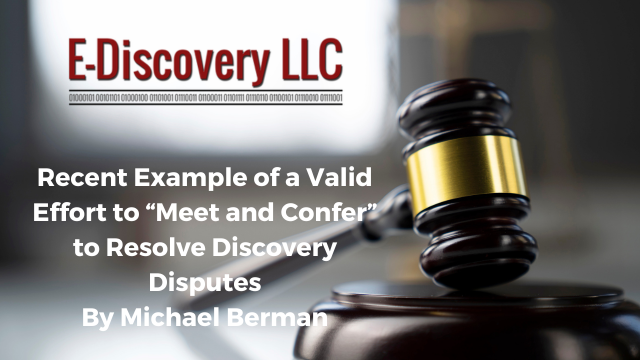
[EDRM Editor’s Note: The opinions and positions are those of Michael Berman.]
Frequently, courts deny motions presenting a discovery dispute due to the failure of the moving party to engage in a good faith, pre-filing “meet and confer.” See, e.g., There’s No Right or Wrong Answer – But There Are Mistakes (Apr. 19, 2024) (“If two sides are battling over nine separate discovery issues for at least five months, a single phone call does not meet their Local Rule 37.2 obligations…. Chatting for a bit about a dispute…. is not engaging in a good faith meet and confer.”).
In short, cooperation involves disclosures and counter-proposals. See 4 Things You Never Wanted to Hear + 8 Lessons & a Dispute Over Revealing Recipients of Litigation Hold Notices, All in One Case (May 4, 2024).
In Jenkins v. Miller, 2024 WL 3174519 (D. Vt. Jun. 26, 2024), the court found that the following, unsuccessful efforts were sufficient and rejected defendants’ challenge to the process:
Jenkins satisfied her meet-and-confer obligations. On April 1, Jenkins’ counsel (Andrew O’Connor) sent an email offering to meet and confer with Defendants regarding the discovery requests. Mihet’s April 9 email responded that Defendants would provide a response “by April 15.” Mihet did not offer to meet-and-confer, nor did he express a belief that further dialogue was necessary (or would be helpful) for resolution of the outstanding discovery disputes. After the April 15 discovery deadline elapsed, O’Connor offered to meet and confer sometime between April 16 and 23, a request that Mihet again rejected. The Court finds that O’Connor’s efforts satisfy both the local and federal rules’ requirements that parties make “good faith” attempts to resolve non-dispositive issues without Court intervention.
Id. at *2 (emphasis added; citations to record omitted).
President Lincoln suggested that one who kills one’s parents cannot seek mercy as an orphan. That principle appears to have been at play here. A party that refused to cooperate cannot defend against a motion by asserting that more cooperation was required.
Mihet’s April 9 email responded that Defendants would provide a response “by April 15.” Mihet did not offer to meet-and-confer, nor did he express a belief that further dialogue was necessary (or would be helpful) for resolution of the outstanding discovery disputes.
Jenkins v. Miller, 2024 WL 3174519 (D. Vt. Jun. 26, 2024).
In the District of Maryland, Local Rule 104.7 requires “more than sending an email or letter to the opposing party. It requires that the parties meet in person or by video or telephonic means for a reasonable period of time in a good faith effort to resolve the disputed matter.” See District of Maryland’s Proposed Amendment to “Good Faith” Conference Rule (Apr. 7, 2023). However, a certificate of compliance may recite “counsel’s attempts to hold such a conference without success….”
Courts have recognized a futility exception to the requirement of a good faith conference. See Do You Have to Ask an Opponent for a Privilege Log? (June 25, 2024); There’s No Right or Wrong Answer – But There Are Mistakes (Apr. 19, 2024).


